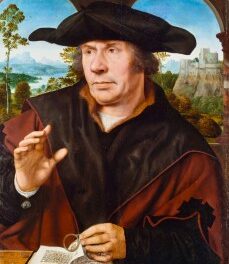We support our Publishers and Content Creators. You can view this story on their website by CLICKING HERE.
Just as all men recognize tyranny as the most oppressive regime, we should recognize a tyrannical soul as the most onerous. The tyrannical soul gets exactly what it wants, but this is a curse, not a blessing. Freedom from all constraint is actually the worst form of slavery.
“A dream is a wish your heart makes.” If so, then dreams are a revelation of our desires. Yet dreams are also weird. They are bubbles of the subconscious without the barrier of the conscious. While reason is asleep or intoxicated, appetite takes the helm and steers for uncharted waters. Dreams are often jumbled bits of reality—they are rarely coherent in themselves. Despite the seemingly random and uncontrollable nature of dreams, Freud would claim that dreams reveal something true that has been suppressed or hidden; they are the real us.
We generally regard freedom as the ability to do whatever you want. If someone forbids me from eating a gallon of ice cream in one sitting, I am less free. The prohibition against leaving cars on blocks restricts my choice. Hamlet is bound by the “canon against self-slaughter.” Laws and taboos restrain my ability to do what I want, and so I am not free. In this model, the most free man is the one most able to subdue reality to his desires. However, to the ancient mind, freedom meant conforming one’s soul to reality. They would claim that freedom from all constraint is actually the worst form of slavery.
In book VIII of Plato’s Republic, Socrates describes the decline of a regime from aristocracy to tyranny. At each step, the soul and city move by degree from the good and rational to the base and appetitive. Pure desire rules in the tyrannical city. Answering the question of justice raised in the opening of the book, Socrates contends that the tyrant is actually less happy than the just man even though the tyrant possesses absolute power. Absolute power turns out to be nothing other than absolute slavery.
Tyranny arises directly from democracy. The democratic regime values freedom and liberty, so it allows every individual to do what is right in his own eyes. The city boasts of such great diversity that Socrates describes it as a many-colored garment. Yet, it is from this extreme freedom that extreme slavery develops. The poor masses demand that the tyrant seize money from the rich. He gladly does so to the people’s benefit, but then they discover that it is easier to nurture a cub than to drive out a full-grown lion. Having been fed on the nectar of power, the tyrant turns his stings on the people and exiles anyone opposed to him. He does not even spare his childhood friends, father, or mother.
Socrates describes this as a parable to the soul of man. A man who is accustomed to indulging any pleasure as it comes to him—absolute freedom from restraint—will soon find himself mastered by strong desire. He will be unable to moderate or choose which pleasures should be indulged; the tyrannical man will be mastered by appetite alone. Socrates says, “He is awake, presumably, what we described a dreaming man to be” (Bloom, 576b). Desire leads this man into poverty and ruin, theft and murder, lies and bribery, wretchedness and misery. Although he does exactly what he wants, he is enslaved. “The tyrannic nature never has a taste of freedom or true friendship” (Bloom, 576a).
Being able to do what you want seems like the recipe for happiness. Isn’t the greatest source of misery the fact that we cannot do what we want? In The Voyage of the Dawn Treader, Caspian and his crew approach a mysterious island. When the sailors are told that this is the island where dreams come true, they are ecstatic. Their enthusiasm doesn’t last. A refugee from the island quickly corrects their understanding: “Fools! … Do you hear what I say? This is where dreams—dreams, do you understand—come to life, come real. Not daydreams: dreams.” This is all it takes to drive the crew to frantic activity in their attempt to escape this strange Hell.
Haven’t we all had dreams like that? Wishes or flights of fancy that flit across our brains like the bee too timid to alight on any flower? Yet, reason holds the wheel firm and refuses to pursue them. If every wish came true—if we acted on every desire or impulse—we would be parricides, adulterers, pillagers, beasts. It is the ability to moderate and control these desires through the intellect that makes man, man. The tyrannical soul has no such restraint. It erodes the barrier between thought and action and the distinction between murder in the heart and in reality.
The soul which always gets what it wants is not free, but enslaved. Worse, enslaved to its own desires, it ensconces itself in a personal Hell. It cannot leave even through an unlocked door. This is the curse of wickedness: to get exactly what you want when your desires are not good. Lewis, a great student of Dante and Boethius, incorporates this idea into The Magician’s Nephew. The witch takes the apple of life and will never die naturally, but it is a miserable existence. “All get what they want, but they do not always like it.”
We often don’t know what we really want. We might sacrifice twenty years of sixty-hour weeks for a boat, a nice house, and gadgets, but then wish we would have spent more time with our children. The politician cuts off his former friends to rise within the inner circle of bureaucrats but is miserable and wishes he could return to beer and poker night without a scandal. The paradoxical nature of desire drives a man to eat a bag of chips even though it doesn’t satisfy. Sin entices and allures, but then abandons man to self-hatred and loathing. The heart is an abyss, unfathomable even by its owner.
In Dante’s Inferno, the punishment at each circle of hell is proportional and fitting to the sin. Each sinner suffers from what he chose in life. The adulterous Francesca and Paulo who loved to gaze into the eyes of their beloved are trapped in an eternal embrace. Gilded and beautiful cloaks of immense weight burden the hypocrites. The violent drown in the rivers of blood they caused to flow on earth. Each sinner receives what he wants. His punishment is not just the fruit of his sin—it is his sin revealed for what it is. The sin is the judgement. Sinners are trapped in a Hell of their own desire, a prison of their own making.
Hell is getting what we want if our desires are not good. The student who lies and cheats to get a higher grade has received his reward: He has become a better liar. The man who successfully hides his pornography addiction has the “freedom” to continue destroying his relationship with his wife. The woman who will not stop complaining about her friends or circumstances insulates herself from gratitude, enjoyment, and friendship. Just as virtue is its own reward, the greatest punishment for evil is being wicked.
It can be tempting to imagine the tyrannical soul as the supreme possessor of power. Much like “rich” means anyone with more money than us, or “obesity” refers to anyone with a higher BMI, “tyrants” are those that are enslaved to extreme desires. But Hell is hopelessly banal. In The Great Divorce, Lewis imagines that the souls of hell are given a trip to heaven. Would any choose to stay? Through his sketches of various characters, we discover that they are all surprisingly mundane in their sins. There is a man interested in his academic career, a mother obsessed over her son, an unappreciated poet, but only one sinner out of scores can die to his desires. Thus, Lewis can conclude, “All that are in hell, choose it.” They are trapped by their own choices and desires. Self-deception is the only lock on hell’s door.
The road to hell is gentle, gradual decline with no sudden bumps or turns. If a man enslaved by his desires were to get in a drunk-driving accident or commit manslaughter, he might be awakened to his true condition. But the continual acts of impiety—mumbling through the hymns at church, neglecting prayer or Scripture, filling the time with Netflix and easy entertainment—lull a man to sleep and make him blind to his state. Much like one who has damaged his hearing through years of too-loud music, the soul lulled by banal evil cannot distinguish music from noise. Though numbed to the goodness and beauty of the world, it calls this limitation “freedom.”
Just as all men recognize tyranny as the most oppressive regime, we should recognize a tyrannical soul as the most onerous. The tyrannical soul gets exactly what it wants, but this is a curse, not a blessing. “It must be the case that the wicked are less happy if they achieve their desires than if they are unable to do what they want,” Boethius writes. “For, if desiring something wicked brings misery, greater misery is brought by having had the power to do it, without which the unhappy desire would go unfulfilled” (Watts, III.iv).
This is why when God punishes a man, he turns him over to his own desires (Romans 1:24–25; Hebrews 12:8). Unrestrained choice apart from law or punishment is not freedom. Those whom God loves, He disciplines and corrects (Hebrews 12:6). He imposes boundaries as a means to freedom. This seems counterintuitive, but it applies to many aspects of life. You do not become more free if you decide that roads are too restrictive and drive into a ditch. The pilot can’t assume that the traffic controller’s instructions are a limitation on his personal freedom. The conservative impulse toward law and self-restraint is necessary for true freedom because freedom aims toward the good.
The aristocratic soul learns to yield its desires under the logos and the good. It submits to an order outside itself and finds liberty. This soul is willing to be commanded by good and just restraint so it can be free. It does not seek to master, but to be mastered. For this soul, God’s commandments are not burdensome and his law is a delight. Lewis writes, “There are only two kinds of people in the end, those who say to God, ‘Thy will be done’, and those to whom God says, in the end, ‘thy will be done.’” The Hellish soul receives its desire and, thus, its reward.
This essay was first published here in April 2021.
The Imaginative Conservative applies the principle of appreciation to the discussion of culture and politics—we approach dialogue with magnanimity rather than with mere civility. Will you help us remain a refreshing oasis in the increasingly contentious arena of modern discourse? Please consider donating now.
The featured image is courtesy of Pixabay.

 Conservative
Conservative  Search
Search Trending
Trending Current News
Current News 






